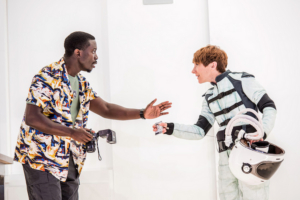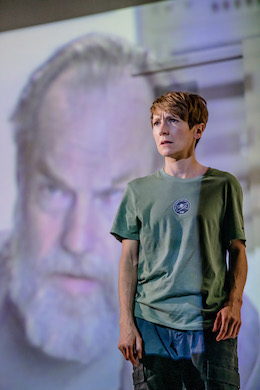Guest Blog: Actress Polly Frame On SOLARIS at Lyric Hammersmith

I GET TO WEAR A SPACE SUIT. Let's start with that...
I get to wear a space suit and travel, every night (who knows exactly how many light years), to a space station overlooking a planet called Solaris. A planet that is completely covered in ocean and orbits two suns. A planet that - those on this space station think - might be conscious. Not a bad day in the office.
I joined this amazing stage production of Solaris, written by David Greig and directed by Matthew Lutton, at the end of August when my fellow intergalactic adventurers returned from performing at the Malthouse in Melbourne - and I couldn't feel luckier.
I've always been fascinated by space exploration and the enormity of what is out there. Growing up in the Scottish borders back when the skies seemed bigger, I was often out at night, neck back, mouth open, without the words to describe the massive arc of infinite and exquisite 'unknownness' above. My bedroom walls were covered with glow-in-the-dark stars, badly blue tacked on. My brain is still no less blown by contemplating intergenerational journeys and staring up into the light of stars already long dead.
This job is a gift - and a gift made possible by David Greig's decision in his adaptation of the original novel by Stanisław Lem. David has swapped the genders of three of the inhabitants on board the station above Solaris: biologist Dr Sartorius and psychologist Dr Kris Kelvin were both originally male characters and 'visitor' Ray was originally Reya, female.
Lem was writing at a time when space exploration and indeed scientific study were predominantly male-dominated, with women making vital, but far too infrequent appearances - gender roles seemed depressingly fixed. In both the novel and subsequent film adaptations, Dr Kelvin, played by an older man, encounters his much younger and more vulnerable ex-lover, played by a younger woman.

in Solaris
Traditionally, this has been the norm in the performing arts too - younger women playing opposite older men - but in this production I find myself with the opportunity of having that dynamic reversed. Why has it taken so long? It is rich material to play and I hope challenges some deep-seated social preconceptions.
I'd never really considered myself a big sci-fi fan. Sure, I love a lot of the films, but I'm fast being seduced by the far-reaching possibilities of the genre. In Solaris, we simultaneously journey through space whilst finding ourselves in the unknowable universe of our own brains. Dr Kelvin asks "Can a planet be conscious?" Solaris seems to be able to reach into our private and subjective understanding of ourselves and offer back to us what it finds there as communication. Why? What does it want?
It's thrilling staring out into Paul Jackson's extraordinary light show that is the planet Solaris, wondering: if human experience is the baseline we use for testing all our encounters with anything 'other', can we ever truly understand another kind of consciousness that displays no characteristics with which we can identify? It's a brain-buckling show to perform - especially having to physically navigate Hyemi Shin's incredible set, which, behind the closed shutter, acts like a kind of demonic advent calendar.
It's been fascinating engaging with audience members about what Solaris might be. When we look into the unknown, are we always in some way seeking our own reflections? One prescient audience member in Edinburgh suggested Solaris might be our own planet Earth, post a climate change apocalypse. Finally consumed by rising sea levels and now completely covered in ocean, it hangs alone in the darkness, all our memories trapped inside....
Solaris is at Lyric Hammersmith 10 October-2 November
The production is a co-production between the Lyric Hammersmith Theatre, Malthouse Theatre, Melbourne and the Royal Lyceum Theatre Edinburgh
Photo credit: Mihaela Bodlovic
Comments



